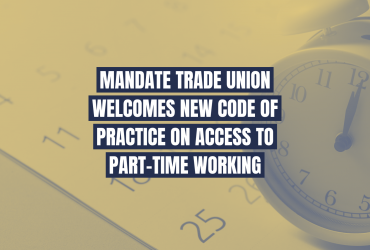
What kind of freedom?
Tuesday 27 August 2019By Miss C. Cahalan
President of the Irish Union of Distributive Workers and Clerks
October 1921
At the moment of writing the question as to who is to rule this country is being discussed in every quarter across the globe. The conversations and conferences that are taking place between the British Prime Minister and Dail Eireann may, and we pray with all our soul that they will, terminate in peace and freedom for our tortured people. What the measure of that freedom will be for the workers of Ireland will soon be made apparent. Is it to be the same kind of freedom that the working classes of the great Republics of France and America enjoy? — or is it freedom in the sense that P.H. Pearse meant freedom when he said: –
“Let no man mistake who will be lord when Ireland is free. The people will be lord and master. The people who wept in Gethsemane, who trod the sorrowful way, who died naked on the cross, who went down into hell will rise glorious and immortal, will sit at the right hand of God and will come in the end to give judgement, a judge just and terrible.”
Or in the sense of James Connolly meant freedom when he said: –
“Ireland as distinct from her people, is nothing to me: and the man who is bubbling over with love and enthusiasm for Ireland, and can yet pass unmoved through our streets and witness all the wrong and the suffering, the shame and the degradation brought upon the people of Ireland — aye, brought by Irishmen upon Irishmen and women, without burning to end it, is in my opinion, a fraud and a liar in his heart, no matter how he loves that combination of chemical elements he is pleased to call Ireland.”
Owing to the political situation and the millitary terrorism of the past two years those elected to represent and legislate for the people of Ireland have not defined, nor have they been asked to define, their attitude towards Irish Labour. Since the cessation of hostilities we have had Mr. de Valera’s speech to Congress at the Mansion House on the 1st August last, in the course of which he said, “Were it not for the cooperation and help of Labour the fight would not have been carried on.” It was pleasing to note that Mr. de Valera refrained from promises of a golden era style to Labour, as is the custom and ways of political leaders. One must respect him for it. Mr. de Valera knows that Labour will get the amount of freedom it is able of itself to take and keep. He also knows that under our present social system in any form of government that is likely to be established capital will undoubtedly be very strongly represented, and progressive and democratic elements will be hampered and obstructed.
Meantime Irish Labour leaders have avowed their allegiance to the doctrines of Pearse and Connolly. On them rests the responsibility (and it is no light one) of showing the way of ensuring that whatever form of native government we may be living under in the future, or whatever kind of a new social order may be founded, that the “rights of man,” not the rights of “private property,” shall be its cornerstone.
The time is fast approaching when Irish Labour must “nail its colour to the mast.” Will Labour in Ireland become a kind of left wing of a bourgeois middle class Assembly, or will it abandon the political arena and rely upon industrial action as a surer means of securing and maintaining the rights of the working class?
We have had some evidence recently of the temper of the rank and file. The miners at Arigna, the creamery workers at Knocklong and Bruree, the Cork Harbour Board employees, and last, but not least, the steel workers at Drogheda, having practical illustrations of their method of securing reforms. The masses of the workers will not, if one is to judge the sign of the time by incidents such as those referred to, be at fault if the ideals of James Connolly are not on the way to realisation.
The toiling masses are no longer content with the rôle of Lazarus to the modern Divas and snatch at his crumbs. They know that they have a God-given right to be all the good things the earth holds for human beings. The time is past for masters who
“Grudge them e’en the breeze that once a week
Might make them feel less weary and deject.”






